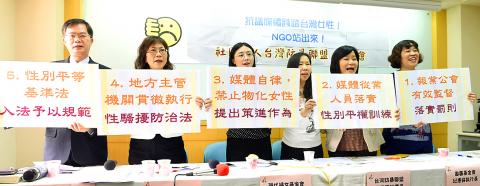Several women’s advocacy groups are urging the public to boycott the Chinese-language Liberty Times (the Taipei Times’ sister newspaper) in protest against several articles that they said espoused discriminatory views against women.
Controversy raged following a recent spat between the Liberty Times and former TVBS news anchor Lee Yen-chiou (李艷秋), with Lee accusing the newspaper of using sexually offensive content to launch personal attacks against her.
The Liberty Times issued an official apology to Lee on Friday last week, but the women’s rights advocates said the apology lacked sincerity.

Photo: Liao Chen-huei, Taipei Times
Led by the Taiwan Coalition Against Violence, several women’s groups yesterday filed a report against the Liberty Times with the Executive Yuan’s Gender Equality Committee, following a wave of criticism against the newspaper over the past week.
The heated debate was triggered by a May 12 report published on the Liberty Times Web site about a severe shortage of news anchors at China Television, with the article describing a recently employed anchor poached from another television station as “flat-chested.”
The report, titled “China Television poaches flat-chested anchor to save crisis amid shortage,” sparked a flurry of criticism from media professionals and women’s groups.
It provoked an angry response from Lee, who wrote an opinion piece in the Chinese-language China Times, accusing the Liberty Times of objectifying women.
The Liberty Times published a second report on Thursday last week that expressed curiosity about Lee’s physique and quoted fictional content about Lee from a pornographic novel written by Chinese netizens.
Lee filed a lawsuit against the Liberty Times, but withdrew all charges after the newspaper issued an official apology.
The debate also took on a political undertone, with writer Huang Chih-hsien (黃智賢) on Monday accusing many women’s rights groups of shying away from the incident because of Lee’s pan-blue leanings.
“It is unbelievable that to this day, we are still judging an anchor’s credentials by the size of her bust. This inflicts utmost harm to women’s right to work,” Sinoseca Social Welfare Association’s Jennifer Wang (王如玄) told reporters at a news conference yesterday.
She said the report could warrant fines from the Taipei City Government for violating the Sexual Harassment Prevention Act (性騷擾防治法).
Taiwan Alliance for the Advancement of Youth Rights and Welfare secretary-general Yeh Da-hua (葉大華) urged the Liberty Times to establish disciplinary guidelines to put a stop to discriminatory reporting.
She pointed out a lack of collective disciplinary guidelines in the media industry, with the quality of journalism backsliding with the advent of fast-paced, Internet-based journalism, leaving little time for journalists to find reliable sources.
Liberty Times spokesperson Jackson Su (蘇宇暉) yesterday said that the newspaper would reflect on its mistakes and improve the quality of the paper’s online content.

The manufacture of the remaining 28 M1A2T Abrams tanks Taiwan purchased from the US has recently been completed, and they are expected to be delivered within the next one to two months, a source said yesterday. The Ministry of National Defense is arranging cargo ships to transport the tanks to Taiwan as soon as possible, said the source, who is familiar with the matter. The estimated arrival time ranges from late this month to early next month, the source said. The 28 Abrams tanks make up the third and final batch of a total of 108 tanks, valued at about NT$40.5 billion

A group from the Taiwanese Designers in Australia association yesterday represented Taiwan at the Midsumma Pride March in Melbourne. The march, held in the St. Kilda suburb, is the city’s largest LGBTQIA+ parade and the flagship event of the annual Midsumma Festival. It attracted more than 45,000 spectators who supported the 400 groups and 10,000 marchers that participated this year, the association said. Taiwanese Designers said they organized a team to march for Taiwan this year, joining politicians, government agencies, professionals and community organizations in showing support for LGBTQIA+ people and diverse communities. As the first country in Asia to legalize same-sex

MOTIVES QUESTIONED The PLA considers Xi’s policies toward Taiwan to be driven by personal considerations rather than military assessment, the Epoch Times reports Chinese President Xi Jinping’s (習近平) latest purge of the Chinese People’s Liberation Army (PLA) leadership might have been prompted by the military’s opposition to plans of invading Taiwan, the Epoch Times said. The Chinese military opposes waging war against Taiwan by a large consensus, putting it at odds with Xi’s vision, the Falun Gong-affiliated daily said in a report on Thursday, citing anonymous sources with insight into the PLA’s inner workings. The opposition is not the opinion of a few generals, but a widely shared view among the PLA cadre, the Epoch Times cited them as saying. “Chinese forces know full well that

Travel agencies in Taiwan are working to secure alternative flights for travelers bound for New Zealand for the Lunar New Year holiday, as Air New Zealand workers are set to strike next week. The airline said that it has confirmed that the planned industrial action by its international wide-body cabin crew would go ahead on Thursday and Friday next week. While the Auckland-based carrier pledged to take reasonable measures to mitigate the impact of the workers’ strike, an Air New Zealand flight arriving at Taipei from Auckland on Thursday and another flight departing from Taipei for Auckland on Saturday would have to